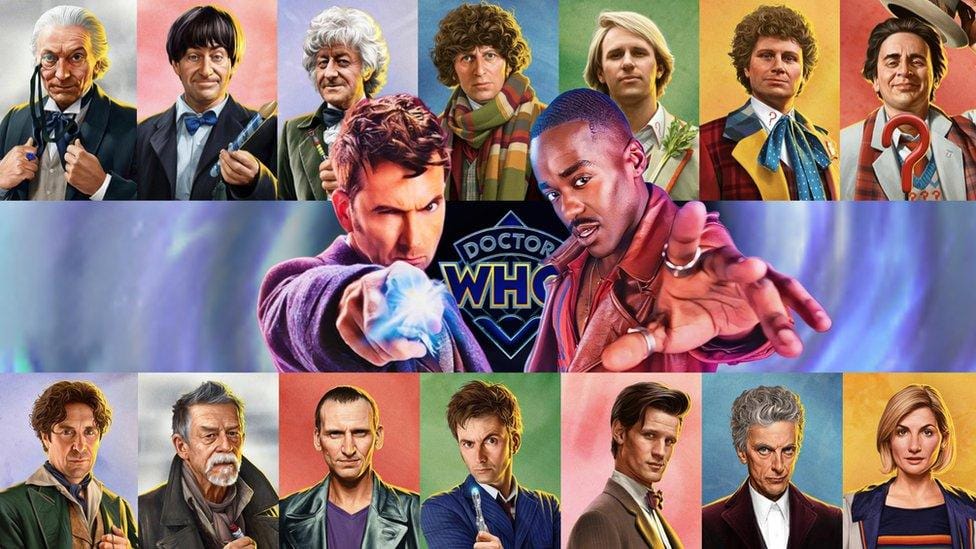This post is a continuation of a series of posts investigating Henry Jenkins’ concepts of “Convergence Culture” and “Transmedia Storytelling”.
See the full series here.

“An Unearthly Child” (Coburn et. al.), Doctor Who’s first episode, was created by the BBC and aired on BBC TV in November 1963. It was written into the canon that when the Doctor is mortally wounded, or simply wears out their body, they will regenerate into a different human form, thus allowing the story to continue and a new actor to take over. The series ran for nearly seven hundred episodes over twenty-six series and years before falling out of popularity and was abandoned by the BBC in 1989 (Jeffery, 2019).

Some of the earliest examples of media convergence, specifically transmedia storytelling, are found within the history of Doctor Who. Henry Jenkins defines transmedia storytelling as “Stories that unfold across multiple media platforms, with each medium making distinctive contributions to our understanding of the world, a more integrated approach to franchise development models based on urtexts and ancillary products” (2006, p. 293) and Doctor Who “embraces convergence culture on an unprecedented scale . . . and what was once regarded as an embarrassment to [the BBC] now spans the media landscape as a multi-format colossus” (Perryman, 2008, p. 21).
This series will now explore Perryman’s article and the use of transmedia storytelling in Doctor Who, and examine the recent partnership between the BBC and Disney in producing the “Whoniverse” (Doctor Who, 2023) to highlight the possible ways in which transmedia storytelling has been used by Disney through Star Wars and to see if this is an indication on how Doctor Who will be produced moving forward with the BBC and Disney partnership.
- [All actors to have played The doctor]. (n.d.). Retrieved 28 January 2025, from https://images.app.goo.gl/dHWiDBKa4uZxpVsu6
- BBC. (2023). Doctor Who: Economic Impact. BBC. https://www.bbc.co.uk/mediacentre/documents/doctor-who-economic-impact-report-fin.pdf
- [Christopher Eccleston as The Doctor]. (n.d.). Retrieved 28 January 2025, from https://images.app.goo.gl/H9TK3QK4M54z61G57
- Coburn, A., Whitaker, D., Newman, S. (Writers), & Hussein, W., Camfield, D. (Directors). (1963, November 23). An Unearthly Child (Series 1, Episode 1) [TV series episode]. In V. Lambert (Producer), Doctor Who. British Broadcasting Corporation (BBC).
- Davies, R. T., Holmes, R., Newman, S. (Writers), & Boak, K. (Director). (2005, March 26). Rose (Series 1, Episode 1) [TV series episode]. In S. Moffat, R. T. Davies, J. Gardner, P. Collinson, B. Minchin, M. Stevens, C. Chibnall, B. Irving, P. Wenger, B. Willis, C. Skinner, M. Young, & F. Penhale. (Executive Producers). Doctor Who. BBC Studios; BBC Wales; Bad Wolf.
- Doctor Who. (2023, October 31). Introducing the Whoniverse! | Doctor Who. [Video]. YouTube. https://www.youtube.com/watch?v=AvbDYtDZk1s
- Eric, P. J. (2016, January 26). How I Finally Realised I Was Wrong About Moffat. Doctor Who TV. https://www.doctorwhotv.co.uk/how-i-finally-realised-i-was-wrong-about-moffat-79647.htm
- Gibson, O. (2008, July 9). Doctor Who helps drive to record profits in BBC Worldwide’s global expansion. The Guardian. https://www.theguardian.com/media/2008/jul/09/bbc.television
- Jeffery, M. (2019, December 3). Doctor Who’s ex-script editor says the BBC ‘ghosted’ the show in 1989: “We weren’t really cancelled”. RadioTimes. https://www.radiotimes.com/tv/sci-fi/doctor-who-cancellation/
- Jenkins, H. (2006). Convergence Culture. Where old and new media collide. New York University Press.
- Perryman, N. (2008). Doctor Who and the Convergence of Media. The International Journal of Research into New Media Technologies 14(1), 21-39.
- Winterson, J. (2014, February 9). Russell T Davies interviewed by Jeanette Winterson at the Cornerhouse. Life on Magrs. http://lifeonmagrs.blogspot.com/2014/02/russell-t-davies-interviewed-by.html
APA7
Cable, J. (2025, Apr 13). Doctor Who Contextualized. JCableMedia.com. https://www.jcablemedia.com/2025/04/13/doctor-who-contextualized/.
Chicago
Cable, John. “Doctor Who Contextualized.” JCableMedia.com. April 13, 2025. https://www.jcablemedia.com/2025/04/13/doctor-who-contextualized/.
Harvard
Cable, J. (2025). Doctor Who Contextualized. Available at: https://www.jcablemedia.com/2025/04/13/doctor-who-contextualized/ (Accessed: 19 April 2025).